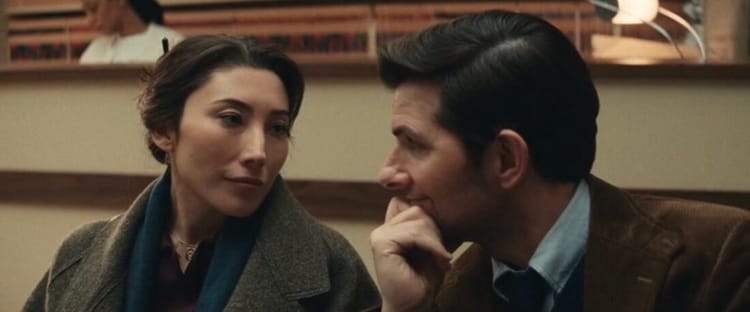The difference between creation and criticism

I know I've been slacking on the free newsletter lately – though paid subscribers have been getting Friday newsletters on everything from David Lynch to the British game show Only Connect – but I am finally out from under my deadlines on both the novel and Yellowjackets. So here's a short thought I've been having lately, and we'll be back in the swing of things next week! – Em
"I don't think I could go back to being a TV critic," I told a friend over dinner recently.
"Why?" she asked. I could tell she, a critic, was perhaps bracing for some sort of sign that I had crossed over to the dark side, where all critics are evil, fun-killing monsters.
I didn't have a good answer, at least not immediately. Everything I wanted to say started to feel like a cliche. I knew too much about how the sausage was made, or I had realized my ultimate purpose, or I didn't want to be an evil, fun-killing monster. I thought about talking about how firmly tied to a former identity my work as a critic became and how that made me mildly dysphoric, but that answer, too, felt wrong. The truth was that I was proud of a lot of the writing I did throughout my career, especially toward the end of my time in journalism. I would never want to besmirch criticism as somehow lesser just because I had switched which side of the line I fell on.
The answer I landed on was this: To be a critic, you have to consider the object as a whole. You can be aware of its parts – the circumstances of its creation, the various choices made to arrive at a certain end, the necessary creative compromises along the way – but in the end, you have to look at the whole and make some sort of value judgment. Yet artists often become so aware of the parts that they can overlook the effect of the whole. Increasingly, if something just doesn't work for me, I start trying to fix the screenplay internally, and that's not good criticism, which must take what is presented as is and not try to find ways to fix it. (Though, inevitably, all critics will find themselves poking at the thing.)
Weirdly, the example that made the most sense to me in that moment was Damien Chazelle's Babylon, one of my favorite movies of the last several years and also (I can acknowledge) kind of a catastrophe. I first saw it shortly before I was laid off, so I still had my criticism brain turned on to some extent. And to be clear, there are big fans and big detractors among my screenwriter friends and my critic friends. But I think what I love so much about it can only truly be loved by my critic brain: It is a big, big movie where the parts and the whole occasionally pull in opposite directions but somehow end up in the same place. It's a story about Hollywood excess and debauchery that underlines how often the studio machine chewed up and spat out people who deserved better, how many lives were ruined by the process of making films, and yet it's also wildly entertaining on a scene-by-scene level. The film's conclusion (which I won't spoil) attempts to wed both the horror of Hollywood and the joy it can bring, and it wrestles itself to a shaky stalemate. It is the kind of movie that most excites me as a critic because it seems like it is constantly chasing itself, and I'm sure if I thought about it too long as a screenwriter, I'd start trying to iron out the imperfections that make it so much the movie I love.
The flipside of this is also true. Now, if I see a thing I truly dislike, I'm more aware of the many ways in which it was likely compromised by notes or production issues or just plain missing the mark. When I worked as a critic, I tried to hold in my brain something that Matt Zoller Seitz said to me very early in my career, which was that nobody sets out to make the worst movie ever, so even if they do, it's worth treating their work with a certain degree of respect. That doesn't mean you don't savage it (it's the worst movie ever made!), but you do try to remember the people who made it are human beings with lofty goals that fell disastrously short. It was a North Star I tried to point myself toward, and though I sometimes failed, I like to think I wasn't bad at it.
Now that I work primarily as a writer of fiction, however, this tendency has gone into hyper-drive. If I see the worst movie ever made, I'll still be, like, "That was the worst movie ever made!" but I will constantly be looking for the places where the intentions of the filmmaker fell short of their abilities. That might be generous to the artist and even necessary in some ways, but it's not particularly useful to the reader of criticism, who's looking to engage with the object and not its parts.
Ultimately, then, this is a question of audience. When I write an episode of TV, I have to think less about myself and more about the people who might watch it, about how I might keep them gripped or moved or entertained. When I watch an episode of TV to review it, however, I am thinking about the people who watch it in a different way, as consumers who are looking for guidance in what to see or who saw a thing and just want to know what the fuck they saw. (You would be surprised how many Google searches at Vox were driven by either "[x] ending explained" or "what was the point of [x]." When people don't like a thing, many of them want to see if they missed something before they start saying it was trash!)
This is not to say that I can't still turn on critic brain when need be. Obviously, I still write some criticism in this newsletter, and I have a piece on a recent film hopefully publishing soon on another site. But I now try to write only about things I have a strong emotional reaction to, and I try not to say, "This is good" or "This is bad" but to, instead, parse out why my reaction was what it was.
I have tried, throughout my writing life, to identify what tics and tendencies I over-relied on. For instance, when I moved to Vox, I had the distinct sense that I had overdone it on writing reviews that related a thing I saw to an experience I personally had, so I tried to do way less of it (though, obviously, I sometimes still indulged). Now, however, I think my tendency to lean on inherent generosity to the filmmaker would run out of control and swallow up everything I wrote.
I know other critics who've made this jump, and most of them have said something roughly similar to me. But I'm sure this is not universal. It's just how I'm thinking about these ideas at this point in my life.
What about you? How do you distinguish good criticism from good art? I'd love to know.
This week's reading music: "Tigers Blood" by Waxahatchee
The free edition of Episodes, which (usually) covers classic TV and film, is published most Wednesdays, and the subscriber-supported edition of Episodes, which covers more recent stuff, is published every Friday. It's written by Emily St. James. If you have suggested topics, please comment (if you are a paid subscriber) or post in the paid-subscribers-only Discord.




Member discussion